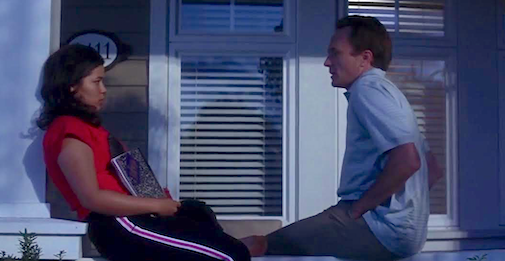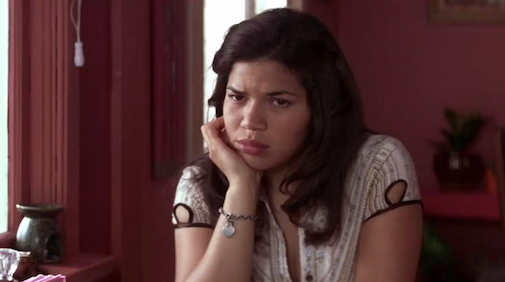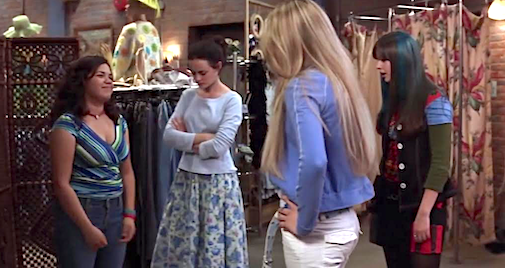by Nick Taylor

We all know the story of The Sisterhood of the Traveling Pants. Four 16-year-old Maryland girls who’ve been friends since birth - Lena Kaligaris (Alexis Bledel), Bridget Vreeland (Blake Lively), Carmen Lowell (America Ferrera), and Tabitha “Tibby” Rollins (Amber Tamblyn) - are about to spend their first ever summer apart. The day before they set out on their separate journeys, they find a pair of jeans that somehow (magically?) fits each of them perfectly. They vow to share the pants the whole summer, each wearing them for a week before mailing them off to the next sister. What surprised me is that the movie did not structure itself around said paints but spent time with all four girls regardless of who had them. To paraphrase one of Carmen’s last lines, the pants aren’t so much a character in Sisterhood but a witness to some of its events. Maybe you think it’s a little iffy to categorize them as supporting, maybe you think the structure giving each one their own plot and weaving them all together at the end allows for it. What’s not up for debate, at least for me, is that America Ferrera’s performance as Carmen is the undeniable highlight of the whole film.
There are a few reasons outside of Ferrera’s performance why I think Carmen’s section of Sisterhood is the strongest...
Her story about summering with her dad in South Carolina, does not invite the degree of postcard photography and broadly cultural music that comes with Lena visiting her family in Greece. What's more the emotional stakes of her journey are present as soon as she gets to her dad’s house, rather than being fully articulated halfway through the film. Ferrera also gets the best screen partner of any of her co-stars, courtesy of Bradley Whitford as her charming but inattentive father Al. And, speaking for the film overall, it’s amazing how completely it refuses to go for the kind of dubious, outsized energy a lot of mid-2000’s live action Disney Channel projects geared towards kids were aiming for. Whatever their faults, you certainly couldn’t accuse the main cast members of overplaying, and Sisterhood takes its character's struggles seriously while still playing for teen and nonteen audiences.

But even before her story kicks off in earnest, Ferrera makes a lovely, concrete impression in the prologue that only deepens as we learn more about her character. She doesn’t overplay Carmen’s introversion, embodying the kind of shy, kind, glue-of-the-squad personality who can wax poetic about her friends in detail but sums herself up as “the writer” without being a wet blanket. The chemistry between all four friends feels lived-in like a fond pair of jeans (traveling or not). You can see why Carmen would say they’re practically a single being, even as each actress brings their own energy to their roles. Still, Ferrera displays the most charismatic presence and the most rounded characterization of the four protagonists while plausibly reading as a teenager at every moment, foregrounding her attentiveness and gregariousness in ways that sit comfortably with her many anxieties. She shades Carmen’s happiness and disappointment in ways that fully earn our empathy even when she lashes out, without skimping on the might of those feelings.
As it turns out, she has a pretty good excuse for being irritated. Rather than spending the summer with just her dad, he introduces Carmen to his fiancé Lydia Rodman (Nancy Travis) and her teenage children a few weeks before they're set to get married. Carmen didn’t even know he had moved! All of her excitement vanishes, and Carmen spends the rest of the evening observing her dad’s behavior with this new family from a certain remove. She’s not just startled by Al’s announcement, or by these mostly kind, aggressively caucasian people, but by the total reinvention this relationship has prompted in her dad, who never once went to church with Carmen or her mom but leads this family in grace before dinner. It doesn’t help that the upcoming wedding leaves Carmen feeling sidelined by a parent she’s beginning to doubt she has any claim to.
Rather than confronting her dad, Carmen spends a lot of her visit grappling with her feelings of displacement and jealousy, sometimes acting out and sometimes stewing in her dissatisfaction until it messily boils over. Carmen might not always know what to do or how to express herself, but Ferrera is uncanny at negotiating these shifts in mood, externalizing Carmen’s thoughts and emotions without reducing her to a series of histrionic outbursts. She delineates when Carmen is prodding this new family or putting on an attitude versus when she’s candidly expressing herself. Ferrera also has the added bonus of Whitford and Travis giving her something to really play against, each making their own choices about when their characters roll with what she’s dishing out and when she shocks them. Lydia never looks sadder than when Carmen, in the time honored tradition of someone who doesn’t want to be a bother and can do their own chores, politely yet firmly declines to let the Rodman’s maid wash her sheets and offers to do it herself.

All of this comes to a head when Carmen tries on her bridesmaid dress, and the proportions are so off from Al’s estimations that the dressmaker decides to start from scratch. The conversation is a series of polite, baffled euphemisms, as though Carmen is not in the room. The young girl responds by upbraiding both the future step mom and the dressmaker before fleeing the shop completely. Ferrera plays this scene with some self-righteousness but makes it clear how much her character's anger is rooted in embarrassment, at being once again (literally) underestimated by her dad in a way that just makes her feel like the problem.
Her time in South Carolina has one last, almost violent goodbye before she returns to Maryland. To her surprise, Tibby points out she hasn’t actually confronted her father about all of this, and Ferrera’s anger at her friend's lack of support is more aggressive and unfettered than we've seen. Still Tibby is right and Carmen finally calls Al. Again, rather than embracing the cathartic anger this kind of scene often invites, Ferrera surprises by conveying instead the heartbreak Carmen has been wrangling with since she got to South Carolina.
After the call, Carmen’s arc recedes. Only when the Sisterhood is reunited does she become the center of the narrative by way of the other girls strong-arming her to attend her dad’s wedding. Her resolution with Al is practically the emotional climax of the film, and constitutes an incredibly intimate gesture despite taking place in the middle of the ceremony. Whitford, Travis, director Ken Kwapis and writers Delia Ephron and Elizabeth Chandler all deserve credit for how deftly this scene is carried out, yet the clear leader here is Ferrera, whose emotional intelligence has been Sisterhood’s most valuable asset. Between this and Real Women Have Curves, I would love to know how Ferrera is able to create such authentic, moving portraits of teenage girlhood despite being well into her 20’s, to a degree comparable with Saoirse Ronan. Or, maybe like the magic of those pants, what Ferrera has achieved here is as much a tribute to her own skill as an actor as to whatever innate quality makes her such a special, one-of-a-kind talent.

More on 2005, our 'year of the month'
- The New Classics: The New World
- When Tilda went Mainstream
- Taraji P Henson in Hustle & Flow
- Colleen Atwood vs Sandy Powell
- Joan Allen in The Upside of Anger
- Gong Li in Memoirs of a Geisha
- The Year of Joseph Gordon-Levitt
- Mercedes Morán in The Holy Girl
- Vintage '05 Pop Culture Highlights
- Rodrigo Prieto's cameo in Brokeback Mountain
- The New Classics: Capote
- Ralph Fiennes in The Constant Gardener